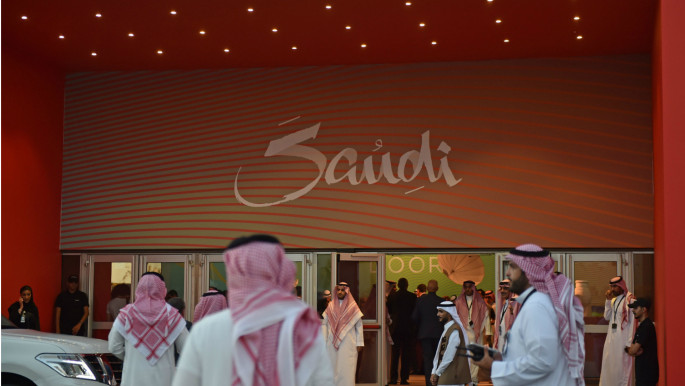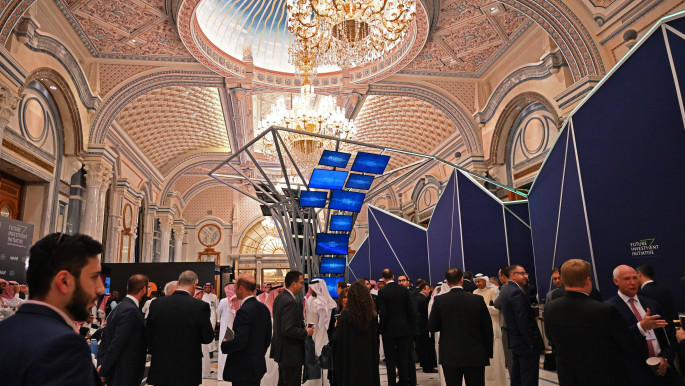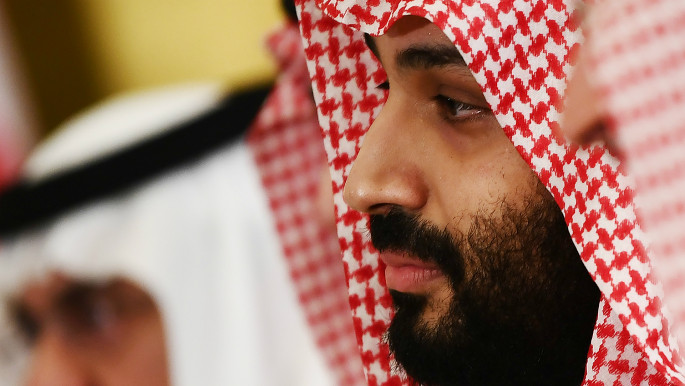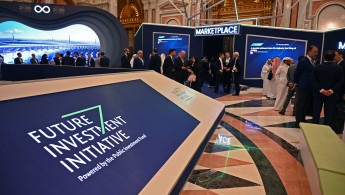'Multi-billion-projects in the pipeline' at Saudi Arabia's Davos in the Desert after last year's boycott
Showcasing business opportunities in Saudi Arabia, the latest edition of the annual Future Investment Initiative (FII) will be held in the capital city on Tuesday. Organisers say 300 speakers from over 30 countries are attending the three-day forum, nicknamed "Davos in the Desert".
The forum made its glittering, star-studded debut in 2017 and became an important venue for global investors to engage with top Saudi business leaders.
Named 'What is Next for Global Business?' this year, the high-level summit is aimed at helping Riyadh in diversifying its oil-reliant economy according to Saudi Vision 2030.
Though the first annual FII was a massive success, the second one did not take off as planned due to an ongoing controversy, as the event took place just three weeks after the brutal murder of Saudi journalist Jamal Khashoggi.
The global fall-out over Khashoggi's killing rendered de facto ruler Crown Prince Mohammed bin Salman [MbS] a pariah, testing alliances with Western powers and casting a shadow on his ambitious reform agenda aimed at weaning the kingdom off its dependence on oil.
The CIA has reportedly concluded that the crown prince, who controls all major levers of power in the Saudi government, likely ordered the gruesome killing.
Most of the invitees had boycotted last year's event as the grisly story made newspaper headlines and became a huge embarrassment for the organisers.
Read more: #JusticeForJamal: Remembering Jamal Khashoggi one year after his brutal murder
Surprisingly, this year several world leaders, celebrities and senior executives from global firms have confirmed their attendance.
 |
|
| Read also: Can the tourism sector in Saudi Arabia prove to be sustainable? |
A year has passed since the last event and the scenario has changed. In an intriguing turnaround, some of the biggest corporate names and top government officials that had boycotted Davos in the Desert last December are returning to the same forum again.
Ostensibly, these companies had ended their business dealings with Saudi Arabia last year.
But it seems the ground realities are now different and several factors have worked in the kingdom's favour.
Firstly, the US presence has been upgraded in the kingdom in the aftermath of the recent attacks on Saudi oil assets. Increasing troop strength in Saudi Arabia, US forces have assumed responsibility for some crucial security aspects and there is now more inter-action and involvement between both governments.
 |
The American delegation to this year's summit is be led by presidential adviser Jared Kushner and Treasury Secretary Steven Mnuchin |  |
Consequently, the American delegation to this year's summit is be led by presidential adviser Jared Kushner and Treasury Secretary Steven Mnuchin. Even though Mnuchin was one of the high-profile attendees that skipped last year's event, he is returning this year and there are reports that the US State Department has booked as many as 45 rooms at Riyadh's Burj Rafal Hotel for its delegation.
Not only that, even US Energy Secretary, Rick Perry, is one of the participants attending the forum as recently he has been holding talks with the Saudi government regarding the use of American technology to build civilian nuclear power plants there.
Secondly, top banking leaders have maintained amicable relations with the kingdom due to the anticipated initial public offering (IPO) by Saudi Aramco.
Valued between $1.5 trillion to $2 trillion, MbS has been saying he could list as much as five percent of this highly profitable company.
According to the Wall Street Journal, Aramco has selected the top nine banks like Goldman Sachs, JPMorgan Chase and Citigroup to underwrite its listing. Therefore, it is not surprising that their senior executives are attending the FII.
Due to the availability of big contracts and attractive business opportunities, international investors gradually began visiting Saudi Arabia again over the last few months. Being the world's leading crude oil exporter, the kingdom remains an irresistible business destination.
 |
Being the world's leading crude oil exporter, the kingdom remains an irresistible business destination |  |
Thirdly, several former and current heads of state like the Prime Ministers of India and Pakistan, David Cameron, Kevin Rudd and others will also be gracing the occasion this year.
However, Pakistani Prime Minister Imran Khan had attended the event even last year when most people stayed away as a gesture of solidarity with Saudi Arabia.
This is mainly because interacting with important business leaders provides a good opportunity to project Pakistan's investment potential, according to the Prime Minister's Office press release.
Meanwhile, it would be Indian Prime Minister Narenda Modi's second visit to the kingdom and his agenda is to include stability in energy supplies and oil prices. Interestingly, India has adopted a severe attitude with Turkey and Malaysia these days as their leaders spoke in support of Pakistan on Kashmir, but its ties with Saudi Arabia are flourishing.
 |
|
| Delegates arrive at the King Abdulazziz Conference Centre in Saudi Arabia's capital Riyadh to attend the Future Investment Initiative (FII) forum [Getty] |
Last year, the Saudi government had announced important investments in both the South Asian countries.
Lastly, in a bid to retrieve lost face, the kingdom had increased its budget for international lobbying firms such as Qorvis Communications in Washington.
Having faced financial and political setbacks due to the outcry after Khashoggi's murder, Saudi Arabia had made regaining its credibility a top priority.
"This year's FII is very different from last year," said Ryan Bohl, from the US geopolitical think tank Stratfor.
"The sanctions threat over Saudi Arabia's human rights record, which led to boycotts last year, is currently over. Many delegates this year have no qualms about getting close to Saudi," he told AFP.
However, there will still be some no-shows.
Most major American media companies are not attending the event and have chosen to drop out from Davos in the Desert again this year.
Deciding against serving as sponsors or media partners, none of them are officially participating except for Bloomberg Media and maybe CNBC, that also only for reporting.
In addition, all of the tech elite from Silicon Valley have decided not to show up at the event, but the unspoken policy is not to refuse Saudi investments.
Notwithstanding last year's boycott, companies like SAO and Amazon Web had continued to expand in Saudi Arabia while the main Saudi investment fund, SoftBank Vision was winning deals in Silicon Valley. Therefore, the absence of the tech crowd at Davos in the Desert 2019 is inconsequential.
 |
The absence of the tech crowd at Davos in the Desert 2019 is inconsequential |  |
As assessed by Robert Mogielnicki from the Arab Gulf States Institute in Washington, "Even if there's no high-profile representation from some of these firms, that's just a public face for one or two conferences. There are multi-billion projects still ongoing or in the pipeline."
 |
|
| Read also: New nationalism on the rise in Saudi Arabia |
This time round, even the organisers of the conference have not been providing much detail about the partners or series of programmes to avoid media scrutiny.
Considering the aspects going in Saudi Arabia's favour this time, the impact and advantages from the conference seem promising and it should help establish the kingdom as a global financial player.
Additionally, even though some companies are still keeping their distance, their absence only provides space for new investors, such as China which has sped up its support for Saudi startups and venture firms over the past year.
If this year's investment conference is a success, Riyadh will have lived down a difficult and embarrassing phase in its history. It could also help repair de facto ruler MbS's global image that was tainted by Khashoggi's killing last October. Even though some hurdles remain, the situation seems to be going back to normal quite fast.
Sabena Siddiqui is a foreign affairs journalist, lawyer and geopolitical analyst specialising in modern China, the Belt and Road Initiative, Middle East and South Asia.
Follow her on Twitter: @sabena_siddiqi



